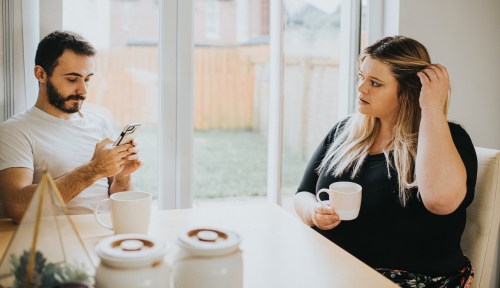Our editors independently select these products. Making a purchase through our links may earn Well+Good a commission
The 7 Biggest Red Flags That You Can’t Trust Someone, According to Psychotherapists and Psychologists
Not sure if you can trust someone? Learn from experts about the top signs of an untrustworthy person and why their behavior can be dangerous.

From the pickleball courts to your favorite rooftop bar, the potential to meet new people is everywhere. If you’re the type to open up about your life story as soon as you meet someone, though, you may be too trusting of others, and it’s possible that you’ve gotten burned more than once as a result. It’s normal to want to give someone the benefit of the doubt, especially if you think they’re a good person deep down, but it’s also important to recognize the signs of an untrustworthy person.
Experts in This Article
board-certified clinical psychologist, cognitive behavioral therapist and author of How to Get Your Resisting Loved One into Treatment: A Step-by-Step Guide for Mental Health and/or Addiction Crisis.
licensed marriage and family therapist, and founder of mental wellness platform Bene and conversation card game Do Tell!
licensed clinical social worker and sexologist
Whether it’s a new friendship, work partnership, or romantic relationship, one of the key components should be trust. “Trust is foundational in relationships; it is the link between emotional security and emotional intimacy,” says Shamyra Howard, LCSW, a certified sex therapist and We-Vibe sex and relationship expert. “When we trust, we can take emotional risks with others because their actions communicate that they are safe and have our best interests in mind.” If you’re someone who’s been in the “too trusting” camp, there are ways that you can hone your red flag radar to better recognize signs of an untrustworthy person, along with signs someone can be trusted.
Keep reading for a guide to spotting the signs of an untrustworthy person, according to psychologists and psychotherapists, and take some notes for the next time you’re contemplating how to set boundaries in a—romantic or platonic—relationship.
Why is trust in a relationship so important?
Trust is associated with honesty, integrity, safety, and reliability. “It impacts another essential component of a strong relationship—vulnerability, which occurs when a person feels safe enough to take their guard down,” says Brian Licuanan, PhD, board-certified clinical psychologist, cognitive behavioral therapist and author of How to Get Your Resisting Loved One into Treatment: A Step-by-Step Guide for Mental Health and/or Addiction Crisis. Being able to open up to someone is dependent on trust, which can take time to solidify in a relationship. “With trust comes the likelihood of more openness and each person willing to give more of themselves emotionally, mentally, physically, and spiritually,” adds Licuanan. So how do you know who you can really trust? It might be helpful to first spot the signs of untrustworthiness.
What does a lack of trust feel like?
Before we dig into the signs of an untrustworthy person and how to spot them, it’s important to examine what a lack of trust feels like. Since trust is so connected to vulnerability, one sign of a lack of trust is an inability to be vulnerable, Howard says. It may look like relationship anxiety or a feeling of being unsupported—it may also feel like the relationship is not “solid” or you always have to be prepared to leave or for the relationship to end, adds Howard. Lack of trust can be present in a friendship, too. It’s possible to feel closed off and guarded around certain friends, says Licuanan. One potential sign of a toxic friendship is a feeling of being guarded or closed off—for example, the lack of ability to be your authentic self around that person or the desire to withhold what you share with that person. You shouldn’t have to feel the need to distance yourself from someone, adds Licuanan.

How do you know if you have trust issues?
There’s no shame in having difficulty trusting people, especially if you’ve been through traumatic or abusive relationships or family situations. Plus, getting over trust issues doesn’t happen overnight, no matter the cause. Here are some signs that trust issues might be hindering your relationships.
1. You can’t stop approaching relationships with suspiciousness or hypervigilance.
“Trust issues can manifest in many ways, though people often experience a constant suspicion of others’ intentions, especially when there’s no clear reason for doubt,” says Nina Westbrook, LMFT and Founder of Bene by Nina and the Do Tell Relationship Podcast. To clarify, sometimes there is a reason to be suspicious of others’ intentions or actions (more on signs of an untrustworthy partner or friend below). But other times, you might experience this hypervigilance or panic, tracking what another person says, texts, or behaves, and it might not be founded—the person might not have given you anything to be concerned about, adds Licuanan. That can be a clear sign of trust issues, which can stem from anxiety.
2. You’re overly cautious about sharing personal things or being vulnerable.
If you’ve been burned by loose-lipped friends in the past who have proven to be untrustworthy, it might cause you to be reticent and cautious about what personal details you share or how vulnerable you are around a new person. “It’s normal to feel fearful of how that information may be used against you,” Licuanan says. As a result, you might be tempted to keep relationships surface level and may not be able to disclose personal or intimate information to not risk being hurt or betrayed, he adds. It can take time to open up to new people, but even once people prove themselves to be trustworthy, lingering trust issues may prevent you from doing deepening the connection.
3. You find yourself overanalyzing every behavior and catastrophizing.
Social media sleuths, you can probably relate to this one. If you’ve ever caught yourself in a deep Instagram hole looking at your new partner’s ex and trying to figure out why they split up, you may be struggling with trust issues. (Unless of course, you’ve heard valid stories that the person you’re dating has a reputation for cheating or lying). If there are no recognizable red flags, trust issues might have you overanalyzing the person’s every word, text, and action and expecting betrayal at every turn, says Westbrook. One source of this relationship anxiety might be a previous experience of being cheated on or broken up with suddenly; it may feel like there’s a way to protect yourself in advance from the pain by trying to stay in control.
4. You have a habit of ending relationships before they get serious.
If you don’t have trust in someone, it’s almost impossible to be vulnerable with that person. Trusting a person may feel too rocky, and you may choose to end relationships before things get too serious to evade that depth and vulnerability, even if you’re not actively, consciously making that decision, says Licuanan. When you’re unsure about a relationship, it’s also common to need constant reassurance from the other person that the relationship is going to work, or to feel accusatory any time you feel anxious that the other person might leave or betray you, adds Howard.

How can you tell if someone is an untrustworthy person?
1. They’re being dodgy.
Dodginess can happen in either a potentially toxic friendship or a romantic relationship with an untrustworthy person. Friends who seem to be evasive about their whereabouts or sketchy about hanging out with your ex and his friend group can be considered untrustworthy. When it comes to a romantic relationship, someone who is consistently hiding their phone can signal a lack of transparency or possibly shady behavior, says Westbrook. There’s a line between someone being private and hiding something. Here are a few notable signs of an untrustworthy person to keep an eye out for, according to experts.
2. Their behavior comes off as shallow or surface-level.
We’ve all had people in our lives that we considered part of a friend group, but who are really more like surface-level acquaintances. If most of your conversations feel like “fluff,” it’s probably not a dependable friendship and it may be a shallow one without much substance. “Sometimes, this person may brag or try to convince you of something about them, others, or things,” says Licuanan. “These people can be overly charming and try to show off via money, possessions, material things, etc.” Untrustworthy friends can also be people who don’t set aside time for you, or when they do set aside time to catch up, the conversation is all about them and what’s going on in their lives. “They can also talk over you and make you feel they don’t want to hear what you have to say,” adds Licuanan.
3. They don’t want to take the relationship public after a significant amount of time.
In terms of a romantic relationship, one sign of an untrustworthy person might be if the other person keeps your relationship under wraps, even after you’ve spent a significant amount of time getting to know each other. If the person you’re seeing has been holding off on introducing you to their loved ones after you’ve been dating for a while, it’s not a good sign, says Westbrook. Is this person always inviting you over after midnight or for “Netflix and chill” dates? Or are they not taking you out in public for dates or outings? “This could be another indicator of evasive and secretive behavior,” adds Westbrook.
4. They won’t open up and shut down conversations when you try to do so.
This sign of an untrustworthy person goes back to vulnerability. Granted, it can take time to share intimate parts of yourself with another person, especially if that is something that has hurt you in the past. However, if a person has a heightened level of cautiousness and seems closed off or selective in what they’re willing to share with you, it could be that they’re hiding something or are untrustworthy, says Licuanan. This goes beyond shyness or difficulty with vulnerability. Untrustworthy people may try to shut down any conversation that gets too vulnerable, or change the conversation, he adds.
5. They can’t keep your secrets.
One sign of an untrustworthy person is when someone frequently shares private information that you’ve told them in confidence. “These scenarios highlight a pattern of behavior that signals the absence of honesty and integrity, which happen to be crucial elements for any healthy relationship, platonic or otherwise,” Westbrook adds.
6. They tend to lie by omission.
Scientific studies indicate that trustworthiness and dishonesty are incongruent, including a 2020 study1 that linked honesty and humility to trustworthiness based on participants’ behaviors. Dishonesty is not always blatant, though. Lying by omission can have just as much of an effect on your trust and also be a sign of an untrustworthy person. “If someone neglects to disclose an important detail that they know could affect you emotionally, physically, financially, or otherwise, that is a sign that they might be untrustworthy,” says Howard. An example is a partner sharing certain information with you, such as being a month behind on a bill, but the lying by omission part comes in when the person leaves out the part where they lost the money they would have applied to the bill gambling after promising to stop, according to Howard.
Trustworthiness can be on the rocks with dishonesty about ex-partners, too. Another example of lying by omission is a partner telling you that they no longer reach out to their ex, but neglect to mention that they do pick up the phone or answer a text whenever their ex contacts them, adds Howard.
7. They’re flaky or don’t stay true to their word.
Trust is built on a foundation where people follow through on what they say they are going to do. Untrustworthy people might not be consistent in their actions matching their words, says Licuanan. Another sign of an untrustworthy person in your life might be if a friend or potential romantic partner is acting flaky. It may feel difficult to depend on this person if they do not keep commitments and only give superficial excuses like “I had something come up,” adds Licuanan. It can be difficult to trust that this person is making you a priority.
Can you love someone and not trust them?
Believe it or not, you can love someone and not trust them, according to Howard. Love might even be a compelling reason to stay in a relationship even if trust isn’t there, as love and trust are not mutually exclusive. Because of this, it can be possible to still love someone even after a relationship has ended, Howard says. In the same way you can hold onto your love someone once your relationship with them has ended, you can love them without fully trusting them.
“Dealing with untrustworthy people involves a careful balance of confrontation and boundaries.” —Shamyra Howard, LCSW
How to deal with an untrustworthy person
After noticing some of the signs of an untrustworthy person it can be a challenge to rebuild trust if you still want to have a relationship with them. These are some ways you can work through that.
Stay curious before making a judgment, in some cases.
The jury may be out on someone’s trustworthiness—there are not always clear-cut signs of an untrustworthy person, especially in the beginning of a relationship when someone is on their best behavior. The best way to approach this is to spend short bits of time with the person to get to know them, asking questions that might be signs of someone’s trustworthiness or integrity. “Try to understand what their normal way of interacting is before concluding that they are untrustworthy,” Licuanan says. He makes the point that some people might naturally be more shy and don’t initiate questions or share much about themselves until you really know them well. This is not a sign of untrustworthiness as much as a personality trait.
It’s also a good idea to consider the person’s cultural background and past life experiences. For example, in some cultures it may be taboo to talk about sex and intimacy before a certain point in a relationship, and that doesn’t mean a person is being sneaky or evasive when they shy away from questions about their sexual experience. “Use your best instincts, and ask others for their assessments, especially if they know the person,” says Licuanan.
Trust your gut if you need to.
Trusting your gut is easier said than done, but as you move through relationships—platonic, professional, and romantic—you naturally start to pick up on the signs of an untrustworthy person. It may take some time though. “First and foremost, when you are in a healthy place, mentally, emotionally, physically, and spiritually, then trust your instincts,” says Licuanan. No one is automatically born with a gift to spot trustworthy and untrustworthy people—it’s a skill that develops through life experience. If you do feel that pit in your stomach that a person is not trustworthy, Licuanan advises trusting that gut reaction and proceeding cautiously and diligently. It may even be time to disengage with that person completely.
Balance confrontation and boundaries.
“Dealing with untrustworthy people involves a careful balance of confrontation and boundaries,” says Howard. “Start by having an open and honest conversation about your concerns, giving them the chance to explain their actions.” The best way to do this is through using “I” language. For example, “I feel like you have been taking your phone into the other room every time you use it like you have something to hide.” Give them a beat to respond—the best-case scenario is that your partner is planning a special surprise for you. That’s not always the most likely scenario, but stating a neutral concern rather than an absolute statement like “You always hide things from me” might lead to a more productive conversation.
This requires both people to be committed to resolving the issue, though, says Howard. “If you’re committed to maintaining the relationship, setting clear boundaries is essential, ensuring your emotional safety while allowing them an opportunity to rebuild trust,” she adds. Other times, if a certain level of trust in the relationship can’t be reached, it may be time to rethink the relationship in general.

How do you end a relationship with an untrustworthy person?
If you’ve already tried working through the relationship, it might become clear when to stop giving someone the benefit of the doubt. It is possible to get out of a relationship with someone who exhibits the signs of an untrustworthy person. It may just take some patience and directness on your part.
Be honest and direct about the harm they have caused.
Whether the relationship is almost salvageable or beyond saving, honesty is the best policy. Licuanan suggests having an open conversation about the relationship and specific behaviors that make you feel uneasy or anxious. The best way to handle this is to not focus on absolutes or name-calling, like saying “You are not trustworthy,” because this might just increase defensive behavior and derail the conversation. “It is best to address the behaviors and how they make you feel; for instance, ‘When you don’t open up more about yourself while I talk openly about myself, I feel alone,’” Licuanan says. Over time, if there is no course correction with this behavior, it might be time to end the relationship.
Set boundaries when you need to.
It’s important to understand that the signs of an untrustworthy person, as unpleasant as they may be, are often more about what is going on with them and their own insecurities that how they feel about you. Still, it’s important to set clear boundaries and communicate what you will and won’t put up with. If the boundaries you’ve set are not honored (i.e. they won’t stop contacting you even after you’ve asked for space), that is a good reason to end, or at least pause, the relationship.
Know when to cease contact.
If someone has proven themselves to be untrustworthy both in their behaviors and in that they can’t seem to respect your boundaries time and time again, you may have to end the relationship. This is reserved for cases where being in contact with the other person is causing you more harm than good, says Licuanan. Do whatever you need to do in those situations to disengage and cease contact. This might include deleting or blocking their phone number, unfollowing them on social media platforms, or all of the above. This can also help you heal from the relationship—as the saying goes, “out of sight out of mind.”
Final thoughts on communicating with an untrustworthy person
Once you’ve identified signs of an untrustworthy person in your life, you may struggle with setting boundaries or voicing your concerns. In this case, it’s a good idea to consult with a mental health counselor or a licensed relationship therapist to determine whether the relationship is worth saving and how to move forward, advises Howard. Taking these steps can be difficult and require immense emotional energy on your part, but it’s worth it to ensure that the people in your life are going to support you just as much as you support them.
- Ścigała, Karolina A et al. “Dishonesty as a signal of trustworthiness: Honesty-Humility and trustworthy dishonesty.” Royal Society open science vol. 7,10 200685. 28 Oct. 2020, doi:10.1098/rsos.200685↩︎
Sign Up for Our Daily Newsletter
Get all the latest in wellness, trends, food, fitness, beauty, and more delivered right to your inbox.
Got it, you've been added to our email list.










